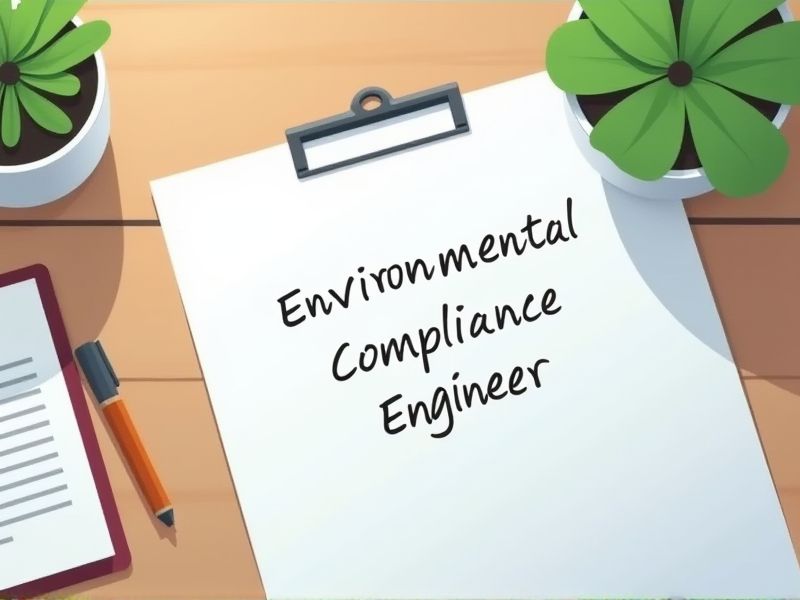
Organizations are increasingly focusing on sustainable practices, driving the need for expertise in environmental regulations. Environmental Compliance Engineers play a critical role in ensuring that companies adhere to legal and environmental standards. Obtaining certain certifications provides these professionals with validated knowledge and skills necessary for effective regulation compliance and risk mitigation. Some important certifications for an Environmental Compliance Engineer include:
Certified Environmental Professional (CEP)
Environmental Compliance Engineers often work with complex regulations that require specialized knowledge, which a Certified Environmental Professional (CEP) possesses. The certification validates a professional's expertise in environmental laws, ensuring projects adhere to necessary legal standards. Hiring a CEP reduces the risk of non-compliance penalties, which can result in costly fines and project delays. CEPs are trained to identify potential environmental impacts, enhancing sustainable project outcomes.
Certified Hazardous Materials Manager (CHMM)
A Certified Hazardous Materials Manager (CHMM) enhances the Environmental Compliance Engineer's capability to manage hazardous materials safely, reducing risk of regulatory penalties. Expertise gained through CHMM certification ensures proper handling, storage, and disposal of hazardous substances, preventing environmental contamination. This certification verifies the engineer's understanding of complex environmental laws, ensuring projects align with legal requirements. Organizations benefit from the certified knowledge, as it supports sustainability initiatives and boosts public trust in environmental practices.
Registered Environmental Manager (REM)
An Environmental Compliance Engineer needs a Registered Environmental Manager's expertise to ensure adherence to legal environmental standards, reducing the risk of non-compliance penalties. The REM provides valuable insights into sustainable practices, enabling the engineer to implement environmentally responsible projects. Their role involves assessing environmental risk and developing mitigation strategies, enhancing the engineer's capacity to safeguard natural resources. Collaboration with an REM helps the engineer to stay updated with evolving regulations and industry best practices, ensuring ongoing compliance.
ISO 14001 Lead Auditor Certification
The ISO 14001 Lead Auditor Certification enables an Environmental Compliance Engineer to effectively assess and align an organization's environmental management systems, ensuring regulatory adherence. This credential enhances the engineer's credibility in identifying risks and implementing corrective actions efficiently. It provides them with in-depth knowledge of environmental laws and standards crucial for compliance. The certification also equips engineers with best practices for promoting sustainability initiatives within an organization.
Certified Safety Professional (CSP)
Obtaining the Certified Safety Professional (CSP) designation enhances an Environmental Compliance Engineer's credibility, highlighting their dedication to workplace safety standards. Employers often seek CSP-certified professionals because it assures a comprehensive understanding of complex safety regulations, crucial for environmental compliance. The CSP credential typically leads to improved risk assessment, which can minimize potential environmental hazards and costly penalties. CSP holders often experience career advancement opportunities as organizations prioritize hiring qualified experts to meet regulatory demands effectively.
LEED Accredited Professional (LEED AP)
A LEED Accredited Professional provides expertise in sustainable building practices, which aids an Environmental Compliance Engineer in ensuring projects adhere to green standards. The credentials demonstrate a deep understanding of environmentally responsible design, construction, and operations, which aligns with compliance goals. Many governmental and corporate projects mandate LEED certification, making it crucial for engineers to possess this expertise to meet regulatory requirements. The accreditation helps engineers effectively communicate sustainability goals to diverse stakeholders, facilitating collaborative efforts in achieving environmental compliance.
Certified Industrial Hygienist (CIH)
Industrial Compliance Engineers often face complex workplace hazards related to air quality, chemical exposure, and noise levels. Employing a Certified Industrial Hygienist (CIH) mitigates these risks by ensuring accurate identification, evaluation, and control of these hazards. Industrial Hygienists contribute their expertise to ensure that engineering projects adhere to both federal and state occupational safety regulations. Their specialized knowledge helps in reducing liability issues while maintaining a safe work environment.
Professional Engineer (PE) in Environmental Engineering
A Professional Engineer (PE) in Environmental Engineering is crucial for ensuring that environmental compliance projects meet rigorous industry standards and legal requirements. The PE designation signifies a high level of expertise and ethical commitment, which is essential for developing and implementing sustainable practices. Regulatory bodies often require PE-certified professionals to validate engineering plans, ensuring adherence to environmental laws. A PE in Environmental Engineering provides a competitive edge, as their certified knowledge and skills can effectively navigate complex environmental regulations, minimizing risks for organizations.
OSHA 30-Hour General Industry Certification
The OSHA 30-Hour General Industry Certification provides Environmental Compliance Engineers with a comprehensive understanding of workplace safety standards, crucial for mitigating industrial hazards. This certification ensures engineers are skilled in recognizing potential safety violations, directly impacting an organization's ability to maintain regulatory compliance. Holding this certification enhances an engineer's credibility, which can lead to greater trust from employers and stakeholders in safety-sensitive projects. The training from OSHA equips engineers with practical skills to implement effective safety plans, directly reducing workplace accidents and associated costs.
EPA RCRA Training Certification
EPA RCRA Training Certification is needed because it ensures that Environmental Compliance Engineers understand proper waste management protocols under the Resource Conservation and Recovery Act, crucial for compliance. This training strengthens the engineer's capability to identify and classify hazardous waste correctly, reducing potential legal liabilities for companies. Through certification, engineers gain insights into the latest regulatory updates, ensuring ongoing compliance with federal and state regulations. Having this certification builds professional credibility, assuring employers and stakeholders of the engineer's expertise in environmental compliance.
Summary
As an Environmental Compliance Engineer, obtaining certifications enhances your expertise in regulatory standards, leading to more effective environmental management strategies. It positions you as a knowledgeable authority in compliance matters, making you a valuable asset to your organization. Companies are likely to experience improved compliance performance and reduced risk of environmental violations. Your capability for implementing sustainable practices increases, fostering a culture of environmental responsibility within your teams and projects.
